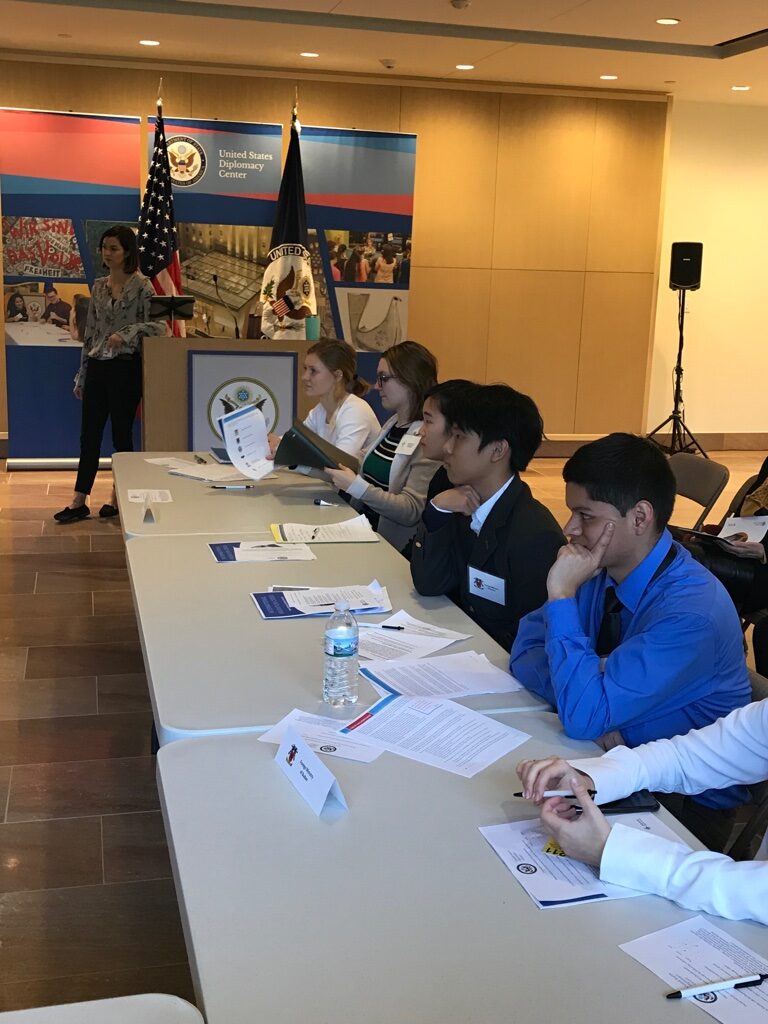Youth Facing the Global Freshwater Crisis: A Diplomacy Simulation & Advocacy Program
Do you want to learn to negotiate international crises like a diplomat? Do you want to explore how to advocate for action on conservation and the environment in the U.S. and around the world?
This is an online program for high school students who are interested in experiencing global citizenship, learning about diplomacy, and engaging in advocacy related to conservation and the environment.
This program has two components: 1) a Diplomacy Simulation designed by the U.S. Department of State, introduces students to the language of “stakeholders” in international negotiations regarding the environment. 2) an Advocacy Service Project engages students with actual domestic and global stakeholders who have interests in conservation and freshwater issues in particular.
Taken together, this program consists of: four hours for the Diplomacy Simulation components, plus four hours for the Advocacy Service Project. PLEASE NOTE: this program integrates the Diplomacy Simulation and Advocacy Service Project, and students seeking SSL credit hours must complete the Advocacy Service Project to receive any SSL credit.
Diplomacy simulation. In two online sessions, students will learn how to negotiate an international freshwater crisis.
Students participate in a Diplomacy Simulation designed by the U.S. Department of State. Students will work in small groups to represent “stakeholders” (e.g. countries, multilateral organizations, NGOs) in a negotiation process.
See here for information about the U.S. Department of State’s National Museum of American Diplomacy, which has designed and which offers these simulations, and here for curriculum materials for the Freshwater Crisis Diplomacy Simulation that students will complete in this program.

This Diplomacy Simulation program includes two online preparation and negotiation Sessions:
- Session 1: Students receive their scenario materials and are divided into stakeholder teams representing the affected countries, the United Nations and a non-governmental refugee rights organization. Teams meet to prepare their negotiating strategies.
- Session 2: Students representing their stakeholder teams learn how to prepare, strategize, and negotiate with each other in informal and formal negotiation sessions, with the goal of achieving a diplomatic solution to freshwater crisis scenario.
Advocacy service project. In addition, students will complete an advocacy service project, under the guidance of program facilitators, following the conclusion of the Diplomacy Simulation
Students write letters and/or emails advocating action on issues of their choice related to the topics addressed in the Diplomacy Simulation.
Under the guidance of the facilitators of the Diplomacy Simulation, students study how advocacy and letter-writing campaigns work. They engage in research on an issue of concern to them, review templates of effective advocacy communications, and finally, draft, edit, and send their letters to elected representatives and/or to the governmental or non-governmental organizations of their choice.
Schedule and Times (Total: Eight Hours)
- One hour of at-home review of preparation materials on the diplomatic process prior to the first online session. At-home review of materials includes completing of readings, watching videos, and preparing a description of their stakeholder’s position regarding the simulation.
- Two 1.5-hour online participatory diplomacy simulation sessions, scheduled in the late afternoon.
- A four-hour advocacy service project where the student will work from home, in contact with the program facilitators, following the second online session. The Advocacy Service Project includes two hours online with instructors and two hours engaging in research and letter-writing on issues of concern to them that are related to the Diplomacy Simulation
SSL credit hours. The program offers high school students the opportunity to earn SSL credit hours through WCIE. The program is designed to satisfy the SSL requirements of the Montgomery County Public Schools (MCPS). If you are enrolled at another public or private school in the U.S., or elsewhere around the world, ask your counselor if this program satisfies community service requirements.
Program dates. We will announce dates for new programs as soon as the Department of State restarts in-person simulations. For more information and to stay informed about dates for new program offerings, email us or ask at English Now!
To register. Students interested in this program must complete an online registration form. Students will also need to provide a short personal statement (two to four paragraphs) explaining why they want to take part in this program and what they hope to learn from their participation. Please email the personal statement to us. Your personal statement should include the name of your school and grade level.
Requirements. Students must be between 15 and 19 years of age. Students must complete the application and provide a short personal statement. Non-native English speaking students must have English language proficiency at a High Intermediate level or above.
Timeline. Students will be informed if they are accepted to the program and will be provided program materials two weeks prior to the first online session.
For more information. Email us with questions or if you would like to be informed when applications are accepted for future program offerings.
Aaron Salzberg, Special Coordinator for Water Resources. U.S. Department of State.